
Vol.64/No.47 July 10, 2000
Join with the socialist campaign in 2000
Harris and Trowe are working-class
fighters and internationalists
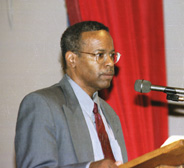
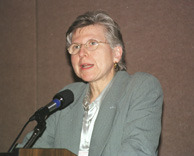
James Harris
Socialist Workers candidate for U.S. President
James Harris is a unionist and member of the National Committee of the Socialist Workers Party. He is a garment worker and member of the Union of Needletrades, Industrial and Textile Employees, currently on a leave of absence from his job in the Atlanta area at Marshall's Distribution Center in order to campaign.
He has been active in working together with co-workers to strengthen his union in "right-to-work-for-less" Georgia, and in building solidarity with struggles of workers and farmers across the United States and internationally.
Harris, 52, was the party's candidate for U.S. president in 1996. He has brought a revolutionary socialist perspective to the fight for Black rights, in mobilizations against imperialism and its wars, and in working-class politics for more than three decades.
He has been a participant in activities to back the growing resistance of working people to the increasingly harsh conditions of life and labor being imposed by the bosses and their government. He has joined labor battles and picket lines, built participation in strikes and social protest struggles, and helped to spread information on these struggles by distributing the Militant newspaper and the monthly Spanish-language magazine Perspectiva Mundial.
Harris has joined picket lines of Teamster members on strike in a fight for union recognition at Overnite Transportation Co., which has a large terminal in Atlanta. When textile workers in Kannapolis, North Carolina, stood up and voted a union in, Harris helped get out the word about this important labor victory--the largest union-organizing drive won in the South in decades.
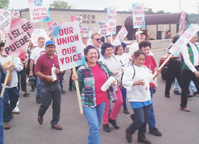 Militant/Jake Perasso |
| Meat packers and supporters march in St. Paul, Minnesota, June 12, as part of fight to win union recognition. Their fight is an example to all working people. |
He has been active in a struggle against police brutality in Valdosta, Georgia, and has participated in activity with the People's Tribunal, an organization fighting to win justice for the family of Willie James Williams, killed while in police custody in that southern Georgia town. He has spoken out to demand an end to the anti-worker and racist death penalty. Earlier this year Harris joined tens of thousands who took to the streets and held meetings to defend affirmative action in Florida against attacks by the state government, and has participated in demonstrations, forums, and rallies against attempts to roll back affirmative action in Georgia.
Through these struggles, Harris has promoted an alliance of workers and farmers, reaching out to farmers defending their land and livelihoods in face of the tightening squeeze that is forcing thousands off their farms. He has demonstrated on numerous occasions with farmers in Washington, D.C., in protests against the U.S. government's continued widespread racist discrimination against farmers who are Black. Harris took part in the March 21 Rally for Rural America in Washington, D.C., which demanded relief from the vise of high operating costs and record-low prices farmers get from distributors and processors, many of them monopoly-owned, for their crops and livestock.
Supporter of Cuba's socialist revolution
In February Harris was part of a delegation to revolutionary Cuba that included six farmers and two members of the Atlanta Network on Cuba (ANOC). The delegation was invited by the National Association of Small Farmers (ANAP) of Cuba. The "Farmer to Farmer" tour, organized by the ANOC, enabled U. S.-born farmers to meet fellow rural producers in Cuba and learn about the advances they have made as a result of the workers and farmers revolution in that Latin American nation. The farmers from the United States were also able to tell the Cuban people about their fight to keep and work their land. The visit helped to advance unity between farmers in the United States and in Cuba.
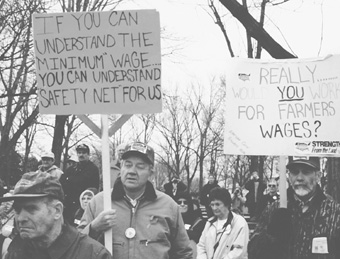 Militant
Militant |
| Farmers from around the country at Rally for Rural America in Washington |
In April 1996 Harris was part of a delegation of workers from the United States who traveled to Cuba to participate in the national convention of the Central Organization of Cuban Workers (CTC), the country's trade union federation. The delegation also visited work sites, talked with fellow unionists in Cuba, and saw firsthand the fighting spirit of workers in Cuba in the face of Washington's 40-year-long trade embargo and other attacks.
Harris lived and worked in Detroit in the early 1990s and was a member of the United Auto Workers there. He helped broaden solidarity with labor struggles such as those of workers on strike against Caterpillar. Harris spent several months in Peoria, Illinois, helping establish a branch of the Socialist Workers Party there in response to the battle by members of the UAW against Caterpillar.
Born into a working-class family in Cleveland, Harris first became politically active in the civil rights movement. With growing protests against racist discrimination, tens of thousands of Black families in the city staged a school strike in the early 1960s, setting up "Freedom Schools" to study African-American history.
On graduating from high school, Harris attended Cleveland State University, where he was a founding member of the Black Student Union. He organized fellow students into demonstrations opposing the U.S. war against the Vietnamese people as well as actions against racist practices of the college, which then had only a small percentage of Black students. He became a member of the Student Mobilization Committee Against the War in Vietnam and later served on its national staff in Washington, D.C.
Through these experiences he joined and later became a leader of the Young Socialist Alliance. He ran for school board in Cleveland on the Socialist Workers ticket in 1969, and soon after joined the SWP.
A supporter of Cuba's socialist revolution, Harris participated in the second Venceremos Brigade to Cuba in 1969 along with hundreds of other youth from the United States. Brigade members cut sugar cane for a couple of months in an expression of solidarity with the efforts by millions of working people in Cuba to maximize sugar production. Working alongside Cuban workers and meeting volunteers from Vietnam, Korea, and elsewhere deepened his sense of internationalism.
Harris moved to Atlanta in the early 1970s, and joined in the struggles of the Black community against police brutalization of working people. At the time, a number of young Blacks had been killed by police SWAT squad units. Later Harris helped mobilize supporters of Black rights in Atlanta to join actions in Boston in the battle for busing and school desegregation in that city.
In 1977 Harris moved to New York to join the staff of the National Student Coalition Against Racism, which had helped lead mobilizations for school desegregation. He became a national chairperson of the coalition.
In the late 1970s the SWP responded to the first signs of growing capitalist economic crisis, employer attacks on the unions, and working-class resistance by getting a big majority of its members into unions in factories and mines. Harris helped lead this effort, becoming a production line worker in 1978 at the Ford auto plant in Metuchen, New Jersey, where he was a member of the United Auto Workers.
Harris later worked in a garment factory in Los Angeles, as the party deepened its industrial base by building units of party members in the garment unions. In Los Angeles he helped the party branch reach out to the growing numbers of immigrant workers coming into the United States, and was the chairperson of the party in the city.
He also participated in brigades to defend the Nicaraguan revolution in the mid-1980s, and joined a delegation to visit revolutionary Grenada in the early 1980s to tell the truth about the first revolution to take power in a Black and English-speaking country in the Caribbean.
He has traveled to Trinidad, Zimbabwe, and South Africa to further links with workers and other fighters in those countries.
Harris served for a time as the national organization secretary of the SWP. He was a staff writer for the socialist newsweekly The Militant in New York. He helped cover the mass battles in South Africa to bring down apartheid as well as the 1989-91 strike by Machinists against union busting at Eastern Airlines. In 1994 Harris traveled to South Africa to attend the Congress of South African Trade Unions convention.
A longtime advocate of independent working-class political action, Harris participated in the National Black Independent Political Party, founded in Philadelphia in November 1980. Harris is a member of the National Association for the Advancement of Colored People as well as the Atlanta Network on Cuba.
Margaret Trowe
Socialist Workers candidate for U.S. Vice President
Margaret Trowe is a meat packer at Quality Pork Processors, the slaughterhouse for Hormel Foods, organized by Local 9 of the United Food and Commercial Workers union (UFCW) in Austin, Minnesota. Along with her co-workers she has most recently been actively winning support for the organizing drive by packinghouse workers at Dakota Premium Foods in St. Paul, Minnesota, who are fighting to gain union recognition, and for striking hotel workers in the Twin Cities area. The St. Paul packinghouse workers staged a seven-hour sit-down strike to demand a slower line speed and some control over job conditions, opposing a brutal speedup by the bosses.
Trowe moved to Austin from Des Moines, Iowa, where she worked in a meatpacking plant in nearby Marshalltown. In 1999, along with other members of UFCW Local 1149 and community activists, she helped found the Ad Hoc Committee for Human Rights, which organized protests in March against attacks on the rights of immigrants. When Marshalltown police announced they would deputize officers with powers to aid the Immigration and Naturalization (INS) cops in deporting Mexican-born workers, packing-house workers organized to get 150 people to a city council hearing to condemn the action.
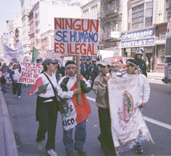 Militant/Patrick O'Neill
Militant/Patrick O'Neill |
| May Day marchers in New York City. Sign says, "No human being is illegal." |
The police chief then decided to drop the deputization plan. A few weeks later, 250 people marched to the county courthouse to protest Operation Vanguard, an INS operation that has driven many Mexican-born workers out of their jobs in packinghouses throughout the Midwest.
Trowe has been active building solidarity with the striking Steelworkers at Titan Tire in Des Moines. Her union local sent $1,000 to the strikers, and fellow meat packers raised funds to buy pork for the strike food bank. Trowe traveled with Titan strikers by bus to Louisville, Kentucky, in February 1999 to join fellow strikers from Natchez, Mississippi, in a protest at the Titan booth at the National Farm Machine Show.
Like Harris, Trowe has worked to forge an alliance between workers and exploited producers on the land--working farmers. Farmers in the Midwest have faced depression conditions for a number of years, generating protest actions and a groundswell of discontent. She participated in these struggles over the past few years, including building support for the Rally for Rural America this past March.
She has also sought to link up workers and farmers in the United States with their counterparts in other countries, such as helping to organize a tour of Iowa by Jose Brito, a leader of the Movement of Landless Rural Workers of Brazil.
This spring Trowe was part of a delegation of fighting farmers and workers that attended the convention of the National Association of Small Farmers of Cuba. The U.S. delegates to the congress met farmers from cooperatives throughout Cuba, as well as international delegates from Brazil, Ecuador, Honduras, Nicaragua, and other countries. Among the farmers they met in Cuba they found tremendous interest in and solidarity with the struggles of farmers in the United States. In turn, the U.S. delegation got a first-hand view of the accomplishments of Cuba's socialist revolution and the historic gains made by workers and peasants in the country.
Trowe has served on the National Committee of the Socialist Workers Party, as organizer of several party branches, and is currently a member of the party's national trade union work leadership committee.
As a teenager in the 1960s, Trowe became active in the fight for Black rights. On a trip to rural Louisiana to visit her grandparents, she became aware of the blatant racist segregation that existed at that time in the South. The growing civil rights movement and battles for Black freedom were in full swing, and seeing racist practices such as separate water fountains and waiting rooms for Blacks and whites at the train station made a deep and lasting impact on her.
As a high school student she joined in the movement to desegregate the public schools in Oakland, California. The school district boundaries were gerrymandered by the government to make the one high school, Skyline High, almost all-white. That high school had the most modern facilities and the smallest class sizes. In one action, hundreds of people marched on a school board meeting to demand an end to segregation. Trowe was a member of the Interracial Relations Club at Skyline.
Trowe helped build the movement against U.S. imperialism's war on the people of Vietnam. As a teenager, she would hitchhike with school friends from Oakland to the Berkeley campus of the University of California, where they participated in rallies against the war. She marched on the Oakland induction center in 1967, and got her first taste of police violence. During this time Trowe became a supporter of the Cuban revolution.
Trowe also got involved in the struggle for women's rights, staffing an abortion rights hot line in the early 1970s, when abortion was still illegal. She was a leader of the Women's Center in Bloomington, Indiana, where women ran the Freewheeling Women's Press in the basement, and printed movement materials.
After moving to Bloomington to begin a four-year Ph.D. program in history, Trowe found that being in graduate school was an obstacle to deepening her involvement in the social movements she had begun participating in. When she wrote a paper on 19th century U.S. history that was sympathetic to the Haymarket martyrs in Chicago and hostile to "robber barons" such as Rockefeller and Carnegie, her professor called her to his office, and said, "You can't take sides," a remark that ended her college years. She instead taught women's studies at the Free University, and got a job as a waitress and cook.
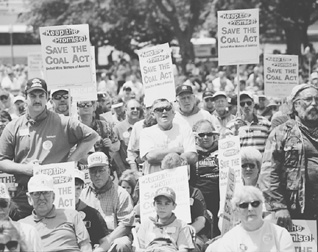 Militant/Stu Singer
Militant/Stu Singer |
| The United Mine Workers of America mobilized some 8,000 miners and retirees for rally in Washington, D.C., May 17 to defend lifetime health-care benefits. |
The onset of the first worldwide recession since World War II in the mid-1970s prodded Trowe to search for a scientific explanation of the workings of capitalism and the exploitation and oppression it perpetuates and reinforces in society. Dissatisfied with rationalizations by pro-capitalist economists, she began reading works by Karl Marx and Frederick Engels, the founding leaders of the modern communist movement. The combination of her experiences and reading convinced Trowe that a revolutionary working-class party was necessary, and she joined the Young Socialist Alliance and the Socialist Workers Party in 1975.
In the 1980s Trowe deepened her study of Marx and Engels during a six-month study session at the leadership school organized by the SWP. Students at the school also studied Spanish. Trowe speaks Spanish and French.
In 1977 Trowe joined other women's rights fighters in Seattle in founding the Washington Equal Rights Amendment Coalition, which organized several marches and rallies. That year Trowe was the Socialist Workers candidate for mayor of Seattle. She remains a member of the National Organization for Women.
Trowe visited Nicaragua in 1982, and met working people who had been part of overthrowing the U.S.-backed Somoza dictatorship in 1979 and initiating an anticapitalist revolution. She joined actions against Washington's assaults on this new beachhead of revolutionary struggle in the Americas, and sought to win co-workers and other unionists to defend the workers and farmers government.
In 1995 Trowe participated in the Fourth World Conference on Women in Beijing, China, which was attended by 30,000 women's rights supporters. She wrote about the conference for the Militant.
Trowe has been an industrial worker most of her adult life. She drove a bus in Bloomington, Indiana, in the early 1970s, became a sheet-metal grinder and fitter in 1975, and worked as a welder/burner/fitter at Todd Pacific Shipyards in 1978, as part of the efforts by SWP members to get industrial jobs.
In 1986 she was part of the mass walkouts that began a successful five-week strike by 5,000 unionized men's clothing workers in Montreal, Canada. She spoke in French at workers assemblies during the strike. On two different occasions she worked in Pathfinder Press's printshop in New York City, carrying out various responsibilities, including in the management of the shop, which produces Pathfinder books and prints the Militant and Perspectiva Mundial.
To find out more about the campaign please write to:
Socialist Workers Campaign, P.O. Box 20169,
New York, NY 10014. Phone: (212) 695-1809.
E-mail: swpcampaign@usa.net
| From Pathfinder |
|
$20 special offer Capitalism's World Disorder Working-Class Politics at the Millennium Jack Barnes The social devastation, financial panics, political turmoil, police brutality, and military assaults accelerating all around us are the inevitable forces unleashed by capitalism. But the future capitalism has in store for us can be changed by the timely solidarity, courageous action, and united struggle of workers and farmers conscious of their power to transform the world. Also available in Spanish and French. Regular price: $23.95 |
|
Changing Face of U.S. Politics Working-Class Politics and the trade unions Jack Barnes A handbook for the new generation coming into the factories, mines, and mills as they react to the uncertain life, ceaseless turmoil, and brutality of capitalism today. It shows how millions of working people, as political resistance grows, will revolutionize themselves, their unions and other organizations, and all of society. Also available in Spanish and French. $19.95 |
|
New International no. 11 $14 U.S. Imperialism Has Lost the Cold War Jack Barnes The Communist Strategy of Party Building Today Mary-Alice Waters Socialism: A Viable Option José Ramón Balaguer Available from bookstores, including those listed under the "Directory of Local Distributors," or write to Pathfinder, 410 West St., New York, NY 10014. Tel: (212) 741-0690. Please include $3 for shipping and handling. |
Front page (for this issue) | Home | Text-version home